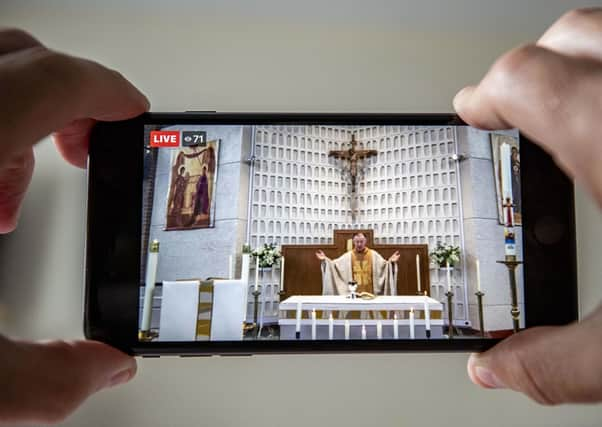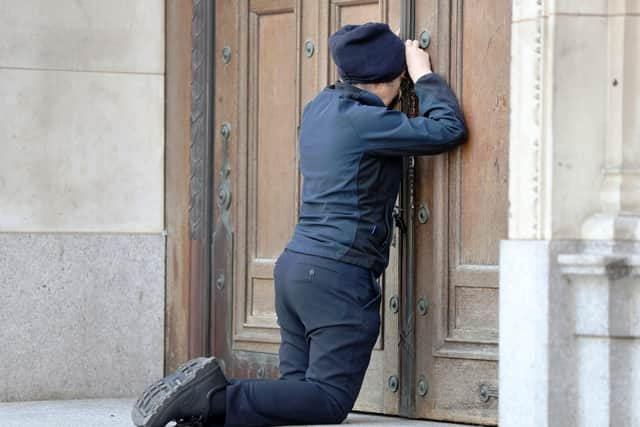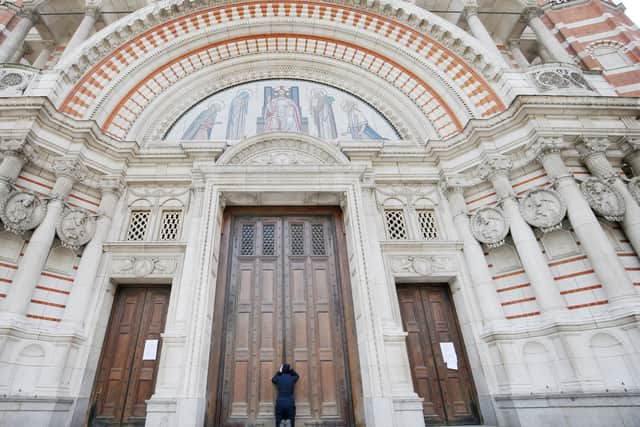Churches and when they should reopen for Mass – Neil McNicholas


As much as I might like to see the day, my answer would be that there really is no rush until a vaccine has been developed that would make such gatherings safe once again.
From a Catholic perspective, the past weeks have been very difficult for those accustomed to going to church at least on Sundays if not also during the week.
Advertisement
Hide AdAdvertisement
Hide AdIt was particularly hard to see Easter come and go without being able to assemble to celebrate the greatest feast on the Christian calendar. The same is now being experienced by the Muslim community as they keep the holy month of Ramadan.


And while they, and we, can pray wherever we are, we are missing not being able to receive holy communion at our normal communal celebrations of Mass, and Muslims are missing not being able to gather for the communal iftar meal that ends each day’s Ramadan fast. But at least we have learned, and are continuing to learn, to be adaptable.
Technology has come to our rescue in that many priests have been able to utilise the internet to broadcast the celebration of Mass from our otherwise empty churches, and many of our parishioners, and people further afield who have internet access, have been able to take part in those celebrations in their own homes.
And it has proved to be very important to people finding comfort and reassurance in being able to “gather” virtually with family and friends and other parishioners for those celebrations.
Advertisement
Hide AdAdvertisement
Hide AdIndeed a recent survey found that 25 per cent of those questioned said they had watched or listened to a religious service on television, radio, or the internet since the lockdown began, compared with six per cent who said ordinarily they were not church-going.


The experience of recent weeks has been very interesting. Again from a Catholic perspective, people are obliged to attend Mass on Sundays as the primary way of keeping the Sabbath. All of a sudden they weren’t able to keep that obligation because churches were closed.
To be honest I can’t help wondering what difference this experience will have made when our churches eventually reopen. How many for whom going to Mass on Sundays has become a matter of habit, rather than choice, won’t return having now got out of that habit? There will, I’m sure, be some.
But that reality can’t become a justification for opening our churches again as soon as we can. The majority of people who have chosen to access the internet in order to take part in the celebration of Mass, albeit without being able to receive holy communion, will surely celebrate with great joy the day on which our churches can reopen, but it’s a day that has to be very carefully chosen.
Advertisement
Hide AdAdvertisement
Hide AdThis week a transport union official was outlining the logistical problems on London Underground trains in considering ways to relax the lockdown.
Obviously people can’t immediately return to rush- hour numbers, and so if social distancing has to be maintained, how long will the queues be of people trying to get into Underground stations in the first place? And how many trains will it take to meet demand if everyone has to sit two metres apart?
The same sort of situation will apply as and when our churches reopen. There aren’t usually queues to get into church, but there certainly will be a limit to how many people can be allowed in at any one time if they have to sit two metres apart in all directions.
And so when that capacity has been met, the doors will have to be closed and no-one else allowed in, and so do we then have to schedule additional services until everyone has been able to attend, or will it be a case of first-come, first-served?
Advertisement
Hide AdAdvertisement
Hide AdCertainly it would seem likely that, for some time, everyone will be required to wear a face mask, including the priest or minister, and that in itself may be a reason for some to decide not to return to church until safer times return.
We have never faced a pandemic on this scale before and some aspects of our daily lives will never be quite the same again – or at least not until a vaccine is found – and church-going, with the practices it has traditionally involved, may, for a while, have to be one of them. Meanwhile technology continues to be available to us until normal services can be resumed.
Neil McNicholas is a parish priest in Yarm.
Editor’s note: first and foremost - and rarely have I written down these words with more sincerity - I hope this finds you well.
Almost certainly you are here because you value the quality and the integrity of the journalism produced by The Yorkshire Post’s journalists - almost all of which live alongside you in Yorkshire, spending the wages they earn with Yorkshire businesses - who last year took this title to the industry watchdog’s Most Trusted Newspaper in Britain accolade.
Advertisement
Hide AdAdvertisement
Hide AdAnd that is why I must make an urgent request of you: as advertising revenue declines, your support becomes evermore crucial to the maintenance of the journalistic standards expected of The Yorkshire Post. If you can, safely, please buy a paper or take up a subscription. We want to continue to make you proud of Yorkshire’s National Newspaper but we are going to need your help.
Postal subscription copies can be ordered by calling 0330 4030066 or by emailing [email protected]. Vouchers, to be exchanged at retail sales outlets - our newsagents need you, too - can be subscribed to by contacting subscriptions on 0330 1235950 or by visiting www.localsubsplus.co.uk where you should select The Yorkshire Post from the list of titles available.
If you want to help right now, download our tablet app from the App / Play Stores. Every contribution you make helps to provide this county with the best regional journalism in the country.
Sincerely. Thank you.
James Mitchinson
Editor
Comment Guidelines
National World encourages reader discussion on our stories. User feedback, insights and back-and-forth exchanges add a rich layer of context to reporting. Please review our Community Guidelines before commenting.